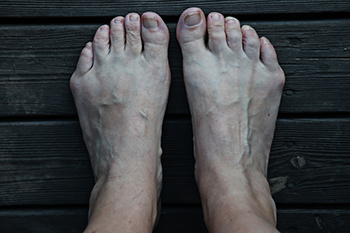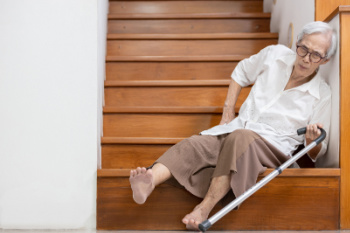Connect With Us
Blog

A tailor’s bunion, also known as a bunionette, is a bony bump that forms on the outside of the foot near the base of the little toe. It occurs when the fifth metatarsal bone shifts outward, often due to genetics, improper foot structure, or wearing narrow, tight shoes that squeeze the toes together. Symptoms include a visible bump, redness, swelling, and pain along the outside of the foot. It may feel irritated or sore, especially when walking or wearing tight shoes. Over time, the discomfort can worsen and make regular activities more difficult. A podiatrist can diagnose a tailor’s bunion through a physical exam and X-rays, then recommend a personalized treatment plan. Non-surgical options include padding, footwear modifications, custom orthotics, and anti-inflammatory medications. In severe cases, surgery may be considered to realign the bone and relieve pain. If you are experiencing this condition, it is suggested that you schedule an appointment with a podiatrist for appropriate treatment.
If you are suffering from bunion pain, contact one of our podiatrists of Advantage Foot and Ankle Center . Our doctors can provide the care you need to keep you pain-free and on your feet.
What Is a Bunion?
Bunions are painful bony bumps that usually develop on the inside of the foot at the joint of the big toe. As the deformity increases over time, it may become painful to walk and wear shoes. Women are more likely to exacerbate existing bunions since they often wear tight, narrow shoes that shift their toes together. Bunion pain can be relieved by wearing wider shoes with enough room for the toes.
Causes
- Genetics – some people inherit feet that are more prone to bunion development
- Inflammatory Conditions - rheumatoid arthritis and polio may cause bunion development
Symptoms
- Redness and inflammation
- Pain and tenderness
- Callus or corns on the bump
- Restricted motion in the big toe
In order to diagnose your bunion, your podiatrist may ask about your medical history, symptoms, and general health. Your doctor might also order an x-ray to take a closer look at your feet. Nonsurgical treatment options include orthotics, padding, icing, changes in footwear, and medication. If nonsurgical treatments don’t alleviate your bunion pain, surgery may be necessary.
If you have any questions, please feel free to contact our office located in Newark, DE . We offer the newest diagnostic and treatment technologies for all your foot care needs.

Using walking sticks can offer important support for people who experience foot, toe, or ankle discomfort during movement. Walking sticks help distribute weight more evenly across the lower body, reducing pressure on painful or unstable areas of the feet and ankles. They can also provide additional stability, which makes it easier to maintain balance and reduces the risk of falls. Walking sticks encourage a more upright posture that leads to better alignment of the feet and ankles while walking. For people recovering from foot or ankle injuries, or managing conditions that cause instability or weakness, a podiatrist may recommend incorporating walking sticks into a treatment plan. By lessening the weight load on affected joints, walking sticks can ease discomfort and promote a more confident, natural stride. Selecting a properly sized walking stick and using it correctly are important steps in preventing further strain. If you experience foot pain when walking, it is suggested that you schedule an appointment with a podiatrist for guidance on using walking sticks.
Exercising your feet regularly with the proper foot wear is a great way to prevent injuries and build strength. If you have any concerns about your feet, contact one of our podiatrists from Advantage Foot and Ankle Center . Our doctors can provide the care you need to keep you pain-free and on your feet.
Exercise for Your Feet
Exercise for your feet can help you gain strength, mobility and flexibility in your feet. They say that strengthening your feet can be just as rewarding as strengthening another part of the body. Your feet are very important, and we often forget about them in our daily tasks. But it is because of our feet that are we able to get going and do what we need to. For those of us fortunate enough to not have any foot problems, it is an important gesture to take care of them to ensure good health in the long run.
Some foot health exercises can include ankle pumps, tip-toeing, toe rises, lifting off the floor doing reps and sets, and flexing the toes. It is best to speak with Our doctors to determine an appropriate regimen for your needs. Everyone’s needs and bodies are different, and the activities required to maintain strength in the feet vary from individual to individual.
Once you get into a routine of doing regular exercise, you may notice a difference in your feet and how strong they may become.
If you have any questions please feel free to contact our office located in Newark, DE . We offer the newest diagnostic and treatment technologies for all your foot and ankle needs.

Falls are a leading concern for elderly individuals and are often linked to underlying health conditions that affect balance and stability. Poor vision from conditions like cataracts or macular degeneration can make it difficult to navigate safely, increasing the risk of tripping or misjudging steps. Diabetes can contribute to falls through nerve damage in the feet, known as peripheral neuropathy, which reduces sensation and affects coordination. Cardiovascular conditions, including irregular heart rhythms or low blood pressure, can cause dizziness or fainting episodes that lead to sudden falls. Other factors such as muscle weakness, joint pain, or medication side effects may also play a role. Falling can seriously impact the feet, possibly causing difficulty in maintaining independence. If you have injured your feet or ankles from falling or want your fall risk assessed, it is suggested that you consult a podiatrist.
Preventing falls among the elderly is very important. If you are older and have fallen or fear that you are prone to falling, consult with one of our podiatrists from Advantage Foot and Ankle Center . Our doctors will assess your condition and provide you with quality advice and care.
Every 11 seconds, an elderly American is being treated in an emergency room for a fall related injury. Falls are the leading cause of head and hip injuries for those 65 and older. Due to decreases in strength, balance, senses, and lack of awareness, elderly persons are very susceptible to falling. Thankfully, there are a number of things older persons can do to prevent falls.
How to Prevent Falls
Some effective methods that older persons can do to prevent falls include:
- Enrolling in strength and balance exercise program to increase balance and strength
- Periodically having your sight and hearing checked
- Discuss any medications you have with a doctor to see if it increases the risk of falling
- Clearing the house of falling hazards and installing devices like grab bars and railings
- Utilizing a walker or cane
- Wearing shoes that provide good support and cushioning
- Talking to family members about falling and increasing awareness
Falling can be a traumatic and embarrassing experience for elderly persons; this can make them less willing to leave the house, and less willing to talk to someone about their fears of falling. Doing such things, however, will increase the likelihood of tripping or losing one’s balance. Knowing the causes of falling and how to prevent them is the best way to mitigate the risk of serious injury.
If you have any questions, please feel free to contact our office located in Newark, DE . We offer the newest diagnostic and treatment technologies for all your foot care needs.

